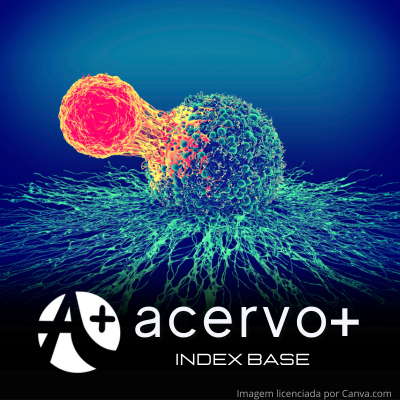Terapia com células CAR-T: uma nova perspectiva para o tratamento de neoplasias
##plugins.themes.bootstrap3.article.main##
Resumo
Objetivo: Explorar e analisar os novos avanços relacionados à terapia CAR-T, destacando suas aplicações clínicas e estratégias para reduzir reações adversas. Revisão bibliográfica: A terapia CAR-T baseia-se em receptores de proteínas de fusão, os antígenos quiméricos (CAR), que são projetados para direcionar linfócitos T a antígenos expressos em células cancerígenas e em desordens autoimunes. Sendo atualmente um grande avanço no campo oncológico para o tratamento, principalmente, de neoplasias hematológicas como leucemias e linfomas. Entretanto, novos estudos já buscam expandir essa forma de tratamento para doenças autoimunes e tumores sólidos, sendo necessário, assim, um aprimoramento na engenharia genética para segurança desses tipos de intervenções. Um dos principais desafios na utilização dessa terapia é a necessidade de buscar uma forma de atenuar possíveis efeitos colaterais graves, principalmente a síndrome de liberação de citocinas e neurotoxicidade. Considerações finais: Investigar e compreender a terapia com células CAR-T é crucial, pois essa abordagem tem mostrado taxas promissoras de resposta e sobrevida, especialmente em pacientes com tumores hematológicos. Portanto, essa terapia oferece uma nova esperança para aqueles que não respondem às terapias convencionais, como quimioterapia e radioterapia.
##plugins.themes.bootstrap3.article.details##
Copyright © | Todos os direitos reservados.
A revista detém os direitos autorais exclusivos de publicação deste artigo nos termos da lei 9610/98.
Reprodução parcial
É livre o uso de partes do texto, figuras e questionário do artigo, sendo obrigatória a citação dos autores e revista.
Reprodução total
É expressamente proibida, devendo ser autorizada pela revista.
Referências
2. BOARDMAN A e SALLES G. CAR T‐cell therapy in large B cell lymphoma. Hematological oncology, 2023; 41(1): 112–118.
3. CAPPELL KM e KOCHENDERFER JN.Resultados de longo prazo após terapia com células T CAR: o que sabemos até agora. Nature reviews. Clinical oncology,2023; 20(6): 359–371.
4. CHOW VA, et al. Translating anti-CD19 CAR T-cell therapy into clinical practice for relapsed/refractory diffuse large B-cell lymphoma. Blood, 2018;132(8): 777–781.
5. FISCHER BN. cell therapy: Mechanism, management, and mitigation of inflammatory toxicities. Frontiers in immunology, 2021;12: 693016.
6. GUZMAN G, et al. CAR‑T Therapies in Solid Tumors: Opportunities and Challenges. Current Oncology Reports, 2023; 25: 479–489.
7. HOPFINGER G, et al. CAR-T cell therapy in diffuse large B cell lymphoma: Hype and hope. HemaSphere, 2019; 3(2): 185.
8. HU B, et al. Chimeric antigen receptor T-cell therapy for aggressive B-cell lymphomas. Frontiers in oncology, 2024; 14: 1394057.
9. HUNTER BD e JACOBSON CA. CAR T-cell associated neurotoxicity: Mechanisms, clinicopathologic correlates, and future directions. Journal of the National Cancer Institute, 2019; 111(7): 646–654.
10. JOGALEKAR MP, et al. CAR T-Cell-Based gene therapy for cancers: new perspectives, challenges, and clinical developments, 2022; 10: 3389.
11. LEE DW, et al. T cells expressing CD19 chimeric antigen receptors for acute lymphoblastic leukaemia in children and young adults: a phase 1 dose-escalation trial. Lancet, 2015; 385(996): 517–528.
12. MUNSHI PN e UJJANI C. The acceleration of CAR-T therapy in non-Hodgkin lymphoma. Hematological oncology, 2019; 37(3): 233–239.
13. MAUDE SL, et al. Chimeric antigen receptor T cells for sustained remissions in leukemia. The New England journal of medicine, 2014; 371 (16): 1507–1517.
14. MAUDE SL, et al. CD19-targeted chimeric antigen receptor T-cell therapy for acute lymphoblastic leukemia. Blood. 2015; 125(26): 4017-23.
15. OLUWOLE OO, et al. Navegando pelos desafios: Gestão eficaz de toxicidades em terapias com células T CAR. Journal of the National Comprehensive Cancer Network: JNCCN, 2023; 21: 6–8.
16. PARK JH, et al. Long-term follow-up of CD19 CAR therapy in acute lymphoblastic leukemia. The New England journal of medicine, 2018; 378 (5): 449–459.
17. RIET T e CHMIELEWSKI M. Regulatory CAR-T cells in autoimmune diseases: Progress and current challenges. Frontiers in immunology, 2022; 13: 934343.
18. SERMER D e BRENTJENS R. CAR T-cell therapy: Full speed ahead. Hematological oncology, 2019; 37(1): 95–100.
19. SOARES JEP, et al. Terapia com células CAR-T: reprogramação celular para combater neoplasias malignas. Revista Médica de Minas Gerais, 2022; 32.
20. SOUZA KS, et al. Imunoterapia dirigida com células T-CAR para tratamento de leucemia linfóide aguda. Research, Society and Development, 2020; 9(11): 72891110372.
21. STERNER RC e STERNER RM. CAR-T cell therapy: current limitations and potential strategies. Blood cancer journal, 2021; 11(4): 69.
22. TRABOLSI A, et al. Bispecific antibodies and CAR-T cells: dueling immunotherapies for large B-cell lymphomas. Blood cancer journal, 2024; 14(1): 27.
23. YU H, et al. CART cell therapy for prostate cancer: status and promise. OncoTargets and therapy, 2019; 12:391–395.
24. WANG Z, et al. Current status and perspectives of chimeric antigen receptor modified T cells for cancer treatment. Protein Cell, 2017; 8(12): 896-925.
25. ZHANG S. Current clinical outcome of CD19/CD22 dual-targeting CAR T-cell therapy in refractory or relapsed B-cell acute lymphoblastic leukemia. Highlights in Science, Engineering and Technology, 2023; 54: 264–279.
26. ZHANG BL, et al. Hurdles of CAR-T cell-based cancer immunotherapy directed against solid tumors. Science China Life Sciences, 2016; 59(4): 340–348.

